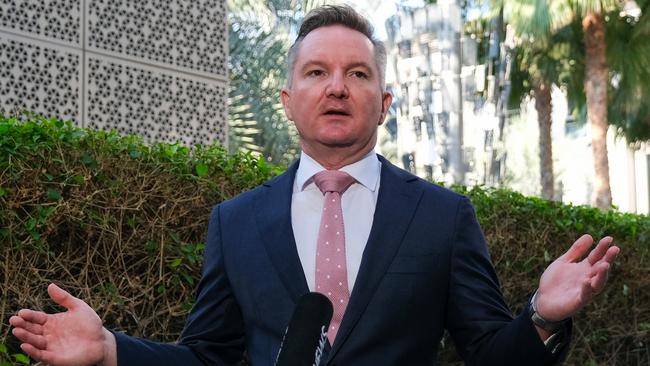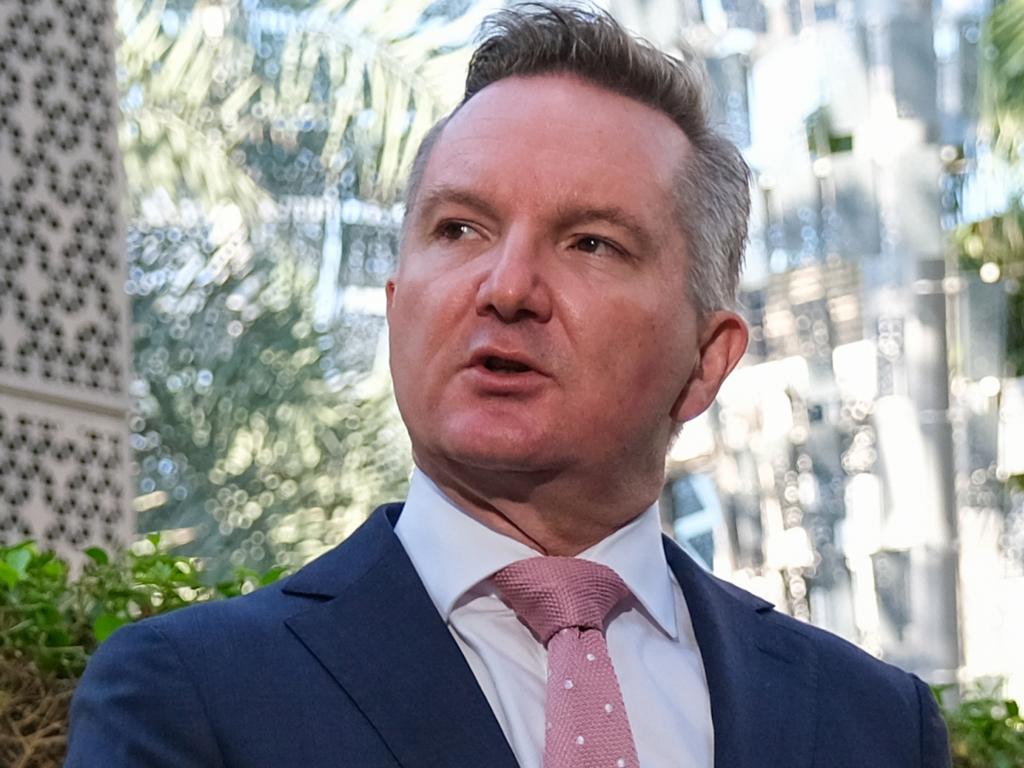Updated COP28 agreement calls on countries to ‘transition away from fossil fuels in energy systems’
China and the US claim credit after more than 190 governments approve a UN climate change declaration calling for the world to move away from fossil fuels.

China and the United States have claimed credit for rescuing the United Nations climate change COP28 agreement from collapse at the last moment, resulting in a Dubai declaration calling for the transition away from fossil fuels being a “turning the corner” moment.
More than 190 governments approved the declaration calling for the world to move away from fossil fuels, in an agreement that went some way towards satisfying nations that produce oil and gas as well as those that want to phase them out.
The COP28 agreement in Dubai, made on Wednesday, follows hours of heated negotiations between parties over the wording on fossil fuels, with Climate Change and Energy Minister Chris Bowen warning a previous version was “weak” and equivalent to a “death certificate” for small island nations exposed to rising sea levels.
US Special envoy John Kerry said the compromise text, which arrived after an intense two days of fraught negotiations, was “a sea change moment” in referencing fossil fuels for the first time. He said while it wouldn’t solve everything overnight the fact that countries signed the deal meant they would be judged by everyone in the world.
The COP28 declaration called on countries to contribute to global efforts to transition away from fossil fuels in energy systems in a just, orderly and equitable manner, accelerating action in this critical decade, so as to achieve net zero by 2050, in keeping with the science.
“I feel we are turning the corner, this is a big ship having to turn, but I think it’s speeding up by the day and I am encouraged by what we have here,’’ Mr Kerry said.
“There were times in the last 48 hours when some of us thought this could fail and we began to look at that prospect and contemplate it, but people showed dogged faith, people stepped up.’’
He said oil and gas producing countries including Saudi Arabia agreed they wanted the COP to succeed. He said: “They accepted the idea of embracing a transition away (for fossil fuels) knowing what that means.’’
Australia’s climate minister Chris Bowen, who led an umbrella group including the United States, Norway and Britain, had argued for a phase-out of unabated fossil fuels and said the discussions have led to “important milestones to combat the climate crisis”.
He said: “Earlier this week we called for more than a step forward and today the world has stepped up. The outcome doesn’t go as far as many of us asked for, starting with some of the most vulnerable countries but the message it sends is clear, that all nations of the world have acknowledged the reality that our future is in clean energy and the age of fossil fuels will end’’. He said the science shows that emissions will have to be cut emissions by 43 per cent by 2030 and 60 per cent by 2035.
Mr Bowen said, speaking in his role as the Australian Climate Minister, he wanted to acknowledge the concerns of the Pacific countries and reassured them their voices on the urgency of energy transition is loud and clear and is being heard.
The alliance of small island states, which includes many of the Pacific countries, weren’t even in the room when the text was quickly approved on Wednesday morning because they were outside formulating a response to what they expected to be a debate about the final text.
However the COP president Sultan Al-Jaber, perhaps learning from the Glasgow COP two years ago when the text was changed in the room at the last minute, simply presented the final draft for approval.
“We have delivered a robust action plan to keep 1.5C in reach,” Mr Al-Jaber said. “It is an enhanced, balanced, but make no mistake, a historic package to accelerate climate action. It is the UAE consensus. We have language on fossil fuel in our final agreement for the first time ever.”
The text includes using controversial technologies like carbon capture and storage as a means to abate fuels needed in the transition.
Mohamed Adow, from the think tank Power Shift Africa, said the carbon capture storage wording was a loophole for fossil fuel interests “to keep dirty energy on life support”.
Both China climate envoy Xie Zhenhua and Mr Kerry said their joint negotiations and discussions with other countries helped save the COP from disaster.
The two countries have separately agreed to a joint US-China working group on climate change to “accelerate together to help other countries” reduce emissions.
Mr Xie said through an interpreter the US-China joint working group would look at energy transition, finances, methane control and controlling emissions so that they can better implement their national climate change commitments.
Mr Kerry said that if China and the US, as the two biggest economies and the two biggest emitters, had to move fast and generate more effort from other countries to keep global warming with the 1.5C level.
Mr Kerry said the next step would be to limit unabated coal production. He also hailed China’s move towards more renewables saying the country had moved on from 18 months ago, deploying more renewables than the rest of the world put together and predicted the country would hit peak emissions well before their target.
He said the COP28 text was now aligned with what the market was already doing, with the money flows heading to renewables in the energy sector and electric vehicles in the transport world.
“The signal out of here today is the whole world is moving even harder to make it happen, it sends signal to the marketplace that demand (for oil and gas) will turn downwards in a couple of years.’’
The declaration also backs a tripling of renewable energy and doubling energy efficiency by 2030.
New COP28 text ‘stronger, more direct’
Mr Bowen – who chairs the COP28 umbrella group that includes the US, UK, New Zealand, Canada, Japan – has been pushing for an end to the use of unabated fossil fuels in energy systems.
Australian Industry Group climate change and energy director Tennant Reed said the new text was much stronger and more direct in calling on parties to contribute to a series of measures in a “nationally determined manner” and taking into account the Paris Agreement.
The previous text called on countries to “take actions that could include … reducing both consumption and production of fossil fuels, in a just, orderly and equitable manner so as to achieve net zero by, or before, or around 2050 in keeping with science”.
But the updated draft asks parties to “transition away from fossil fuels in energy systems, in a just, orderly and equitable manner, accelerating action in this critical decade, so as to achieve net zero by 2050 in keeping with the science”.
“My best judgment is these words meet the test (Mr Bowen) laid out,” Mr Reed said.
“He signalled flexibility on the specific wording on the fossil fuels section as long as the sense that we are moving off fossil fuels in energy systems came through. I think this does it.
“The Alliance of Small Island States and others will be worried there’s a loophole you can drive a truck through – that people will maintain they can do net zero with carbon capture and storage on everything and theoretically there’s just as many fossil fuels as before. These (updated) words are pretty good I think. They’re not viscerally satisfying to people in the environment movement and I think small island nations (will accept these words … with a heavy heart because it’s not as strong as what they called for. It is actually in line with the science.”
However, Greens leader Adam Bandt slammed the global climate summit for producing a “weak word salad” and urged Australia to take the lead in ceasing all new coal and gas projects.
The Australian Conservation Foundation’s climate and energy program manager Gavan McFadzean also criticised the “weak” wording, arguing a target should have been set for a full fossil fuel phase-out.
The push for targets to be set at COP28 was strongly resisted by the Organisation of the Petroleum Exporting Countries, which includes the Saudi Arabia, the UAE, Qatar, Indonesia and others. Climate Council senior researcher Wesley Morgan said while the new wording was a “significant improvement” to previous drafts, there remained ambiguity in statements for “inefficient fossil fuel subsidies” to be phased out.
“The inefficient word is doing a lot of dirty work. Different countries just say, well, we don’t have ‘inefficient’ fossil fuel subsidies, and they keep their fossil fuel subsidies … it would be much better without ‘inefficient’ in there,” he said.
“But at the same time … if the wording stays very similar to this, it’s a really historic moment. In 30 years of climate talk … this will be the first time the world has explicitly said we need to move away from fossil fuels.”
Opposition climate change and energy spokesman Ted O’Brien has used COP28 to advocate for removing uranium mining and exploration bans – in addition to lifting the moratorium on nuclear power.




